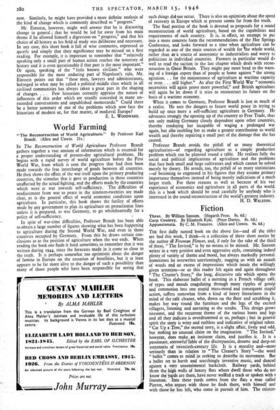World Farming
"The Reconstruction of World Agriculture." By Professor Karl Brandt. (Allen and Unwin. 21s.) IN The Reconstruction of World Agriculture Professor Brandt gathers together a vast amount of information which is essential for a proper understanding of present-day agricultural problems. He begins with a rapid survey of world agriculture before the First World War, from which is seen the progress that had then been made towards the free interchange of goods between all countries. He then shows the effect of the war itself upon the primary producing countries, the stimulus that it gave to production in those countries unaffected by the actual fighting, and the efforts made by the countries which were at war towards self-sufficiency. The difficulties of readjustment from war to peace in the nineteen-twenties are made clear, as is the general effect of world economic conditions upon agriculture. In particular, this book shows the futility of efforts made by any government to plan its agriculture on protectionist lines unless it is prepared, as was Germany, to go wholeheartedly for a policy of self-sufficiency.
In spite of war-time difficulties, Professor Brandt has been able to obtain a large number of figures showing what has been happening to agriculture during the Second World War, and even in those countries occupied by Germany. From this he draws certain con- clusions as to the position of agriculture when the war ends. When reading the book one finds it hard sometimes to remember that it was written during 1944, since the forecasts made in it come so close to the truth. It is perhaps somewhat too optimistic about the danger of famine in Europe on the cessation of hostilities, but it at least appears to be far more alive to the danger of such a possibility than many of those people who have been responsible for seeing that
such things did not occur. There is also an optimism about the speed of recovery in Europe which at present seems far from the truth.
The final portion of the book is devoted to proposals for a sound reconstruction of world agriculture, based on the capabilities and requirements of each country. It is, in effect, an attempt to put into a more concrete form the recommendations of the Hot Springs Conference, and looks forward to a time when agriculture can be regarded as one of the main sources of wealth for The whole world, rather than as a source of annoyance to industrialists and worry to politicians in individual countries. Farmers in particular would do well to read the section in the last chapter which deals with recon- struction in Great Britain. They might pay more heed to the warn- ing of a foreign expert than of people at home against " the strong agitation. . . for the maintenance of agriculture at wartime capacity or even . still higher." As after the First World War " economic necessities will again prove more powerful," and British agriculture will again be let down if it tries to reconstruct its future on the basis of a wartime economy.
When it comes to Germany, Professor Brandt is just as much of a realist. He sees the dangers to future world peace in trying to build up once more a self-sufficient agriculture in Germany. He advocates strongly the opening up of the country to Free Trade, thus not only making Germany closely dependent upon other countries, thereby rendering her incapable of waging a prolonged war again, but also enabling her to make a greater contribution to world wealth and thereby repairing a small part of the damage that she has caused.
Professor Brandt avoids the pitfall of so many theoretical agriculturists—of regarding agriculture as a simple production problem which can be planned round a table. He realises fully the social and political implications of agriCulture and the problems that face both small and large cultivators and which cannot be solved merely by theory. He avoids, too, the pitfall of so many statisticians —of becoming so engrossed in his figures that they assume primary importance themselves instead of being merely indications of a much larger truth. For these reasons as well as because of his vast experience of economics and agriculture in all parts of the world, this is a book which should be read carefully by anybody who is interested in the sound reconstruction of the world's greatest industry.
H. D. WALSTON.


























 Previous page
Previous page